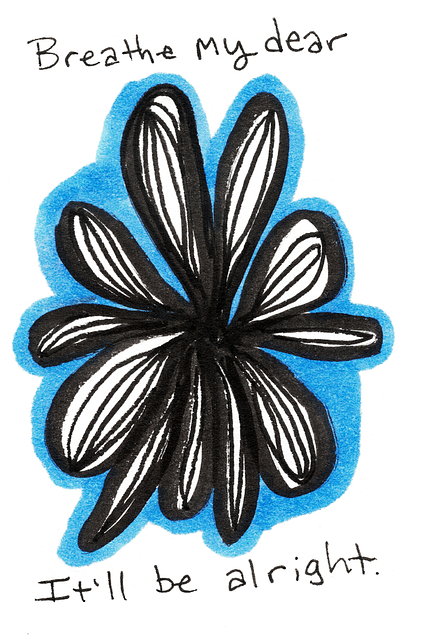Stress relief therapy combines CBT, mindfulness, relaxation exercises, and problem-solving skills to manage stress. Behavior changes, trigger identification, and coping strategies enhance its effectiveness. CBT targets negative thought patterns, promoting emotional control. Relaxation techniques like deep breathing, meditation, and yoga reduce stress levels. Evaluating success includes assessing emotional resilience, coping abilities, and quality of life improvements.
Stress relief therapy is a powerful tool for improving mental well-being. This comprehensive guide explores behavioral stress intervention, delving into key techniques like Cognitive Behavioral Therapy (CBT) and relaxation strategies. We’ll uncover the benefits of implementing behavior changes, highlighting how identifying triggers can lead to effective coping strategies. From understanding the concept to measuring success, discover practical steps to navigate and overcome stress through evidence-based methods.
Understanding Behavioral Stress Intervention

Behavioral stress intervention, or stress relief therapy, is a structured approach aimed at helping individuals manage and reduce their response to stressful situations. This form of therapy focuses on identifying and changing negative thought patterns, behaviors, and responses that can contribute to chronic stress. By learning new coping strategies, individuals can improve their ability to handle challenging circumstances, leading to better mental and emotional well-being.
Stress relief therapy often involves a combination of techniques such as cognitive behavioral therapy (CBT), mindfulness practices, relaxation exercises, and problem-solving skills training. These methods empower individuals to take control of their stress levels, fostering resilience and promoting a healthier balance in their lives. Through tailored strategies, this intervention addresses the root causes of stress, enabling people to navigate demanding situations with greater ease and composure.
Key Techniques in Stress Relief Therapy

Stress relief therapy leverages a variety of key techniques to help individuals manage and reduce their stress levels effectively. One prominent approach is mindfulness, which encourages focusing on the present moment and accepting thoughts and feelings non-judgmentally. This practice has been shown to lower stress hormones and improve overall well-being. Techniques like deep breathing exercises, meditation, and yoga are integral parts of mindfulness practices, helping to calm the mind and body.
Another effective method is cognitive behavioral therapy (CBT), which aims to identify and change negative thought patterns contributing to stress. By challenging unhelpful thoughts and replacing them with more realistic and positive ones, CBT empowers individuals to better cope with stressful situations. Additionally, therapies like progressive muscle relaxation and guided imagery help individuals unwind by tensing and releasing muscle groups or visualizing calming scenes, respectively. These techniques collectively offer a holistic approach to stress relief therapy, catering to different preferences and needs.
Benefits of Implementing Behavior Changes

Implementing behavior changes can significantly enhance the effectiveness of stress relief therapy. By modifying daily routines and adopting healthier habits, individuals can experience a profound shift in their ability to manage and reduce stress levels. This proactive approach empowers people to take control of their mental well-being, fostering a sense of empowerment and resilience.
Behavioral interventions offer a range of advantages. They encourage individuals to develop coping strategies tailored to their unique needs, promoting self-awareness and personal growth. Moreover, these changes can lead to improved overall quality of life, as stress is minimized and emotional balance is restored, enabling folks to navigate life’s challenges with greater ease and clarity.
Identifying Triggers and Coping Strategies

Identifying triggers is a crucial step in behavioral stress intervention, as it enables individuals to recognize and understand their specific stressors. This process involves self-reflection and awareness of situations, thoughts, or activities that consistently evoke a strong emotional response, often leading to feelings of anxiety or distress. By keeping a journal to track these triggers, people can identify patterns and gain valuable insights into their unique stress responses.
Coping strategies are essential tools in managing stress effectively. They provide individuals with healthy ways to respond to triggers and mitigate the intensity of stressful situations. From practicing mindfulness and deep breathing exercises to engaging in physical activity or pursuing hobbies, these strategies offer a range of options for stress relief therapy. Developing a personal toolkit of coping mechanisms allows folks to navigate challenging scenarios with resilience and adaptability.
Cognitive Behavioral Therapy (CBT) Approach

Cognitive Behavioral Therapy (CBT) is a highly effective approach for managing behavioral stress interventions. This therapy focuses on identifying and changing negative thought patterns and behaviors that contribute to stress and anxiety. By challenging unhelpful thoughts and replacing them with more realistic, positive ones, individuals can gain better control over their emotional responses. CBT encourages active participation from the client, teaching them coping strategies and skills to navigate stressful situations effectively.
This evidence-based therapy is known for its structured nature, where therapists help clients set specific goals and work through a series of steps to achieve them. It has proven successful in treating various mental health conditions, including depression and post-traumatic stress disorder (PTSD), offering substantial stress relief therapy benefits. The CBT approach empowers individuals to develop resilience and maintain mental well-being in the long term.
Integrating Relaxation and Mindfulness Techniques

Integrating relaxation and mindfulness techniques is a powerful strategy within behavioral stress interventions. These practices have gained significant attention in the field of mental health due to their ability to provide effective stress relief therapy. By incorporating methods such as deep breathing exercises, meditation, and yoga, individuals can learn to calm their minds and bodies, thereby reducing the negative impact of chronic stress.
Mindfulness, in particular, has emerged as a game-changer in promoting mental well-being. It encourages folks to become fully present, focusing on the here and now without judgment. This simple yet profound shift in perspective can help navigate the labyrinthine paths of stress and anxiety. Through regular practice, one can cultivate a sense of inner peace, enhancing their overall resilience against life’s challenges.
Measuring Success: Evaluating Interventions

Evaluating the success of behavioral stress interventions is paramount in understanding their effectiveness and potential impact on well-being. Measuring success goes beyond simply reducing perceived stress levels; it involves a multifaceted approach to assess improvements in various aspects of an individual’s life affected by chronic stress. This includes gauging changes in emotional resilience, coping strategies, and overall quality of life.
One common method is through self-report questionnaires that measure psychological well-being, satisfaction with life, and the frequency and intensity of stressful events. Additionally, objective measures such as physiological markers (e.g., heart rate variability) can provide insights into the body’s stress response. These evaluative tools help researchers and practitioners understand which components of stress relief therapy are most beneficial and tailor interventions for optimal results.
